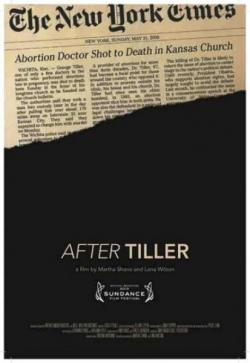Review: After Tiller
 There are four doctors in the United States who openly and legally perform third-trimester abortions. They arrived at their positions not with long-standing intention, but rather due to chance and a stubborn sense of duty -- both to women and to murdered abortion doctor George Tiller.
There are four doctors in the United States who openly and legally perform third-trimester abortions. They arrived at their positions not with long-standing intention, but rather due to chance and a stubborn sense of duty -- both to women and to murdered abortion doctor George Tiller.
Tiller performed late-term abortions at his Wichita, Kansas women's health clinic for decades before he was fatally shot by an anti-choice activist in 2009. Though long the target of serious violence (Tiller was shot in both arms in 1993 and his clinic was firebombed in 1986) and also accused of criminal behavior (he was ultimately found not guilty), Tiller never abandoned his simple personal precept: "Women need abortions and I'm going to do them."
After Tiller, the humanistic documentary directed by Martha Shane and Lana Wilson, avoids discussing abortion from a political point of view and is not a tribute to the late Kansas physician. Instead, the film focuses on Drs. LeRoy Carhart, Warren Hern, Susan Robinson and Shelley Sella -- former colleagues and friends of Tiller who have pledged to continue Tiller's mission to meet the needs of a very small group of women.
Late-term abortions account for less than 1% of all abortions performed in this country, and most women who seek them have hearts overflowing with fresh grief. The late discovery of a serious fetal abnormality or a health issue that would threaten the lives of both mother and fetus necessitate consulting with a different doctor than their own, one whose office is likely far from home and surrounded by vocal protesters holding graphic signs.
Other women who seek the procedure do so for different reasons; they are victims of incest or rape, they suffer from emotional disorders, or sometimes they simply lack the financial and family resources to imagine giving birth to and raising a baby. No matter what brings a woman to one of these clinics, the road before her isn't going to be easy.
The anti-abortion demonstrators who take issue with the doctors featured in After Tiller often embrace the idea that people who perform and seek abortions are cold, callous and disrespectful of life. The filmmakers quietly illustrate otherwise by observing these four as they go about their daily routines of speaking to and maybe treating women whose lives have not gone as planned. In these moments it's clear that agonizing decisions are made at these doctors' offices. God is frequently mentioned. There are tears and hugs. Ultimately, complicated gratitude is expressed.
"No one wants an abortion, but sometimes they're needed." Each of the doctors echoes this sentiment at some point in the film, and each expresses weariness at the outside opposition and internal moral uncertainty they so often face. Not only are the doctors plagued by death threats, property damage and logistical obstacles, they also often find themselves uncomfortable with their judge-like roles. (In New Mexico, where Dr. Robinson and Dr. Sella practice, it is the doctor's decision alone that determines whether a woman is granted a late-term abortion, regardless of her circumstances.) These are heavy weights to bear, and it's clear that what keeps these practitioners going forward is the strongly-held belief that a woman's health and dignity are worth fighting for.
It's the discovery of such simple compassion that makes After Tiller a life-affirming documentary in spite of its subject matter. After a summer of legislative theatrics where Texans saw abortion availability threatened and defended (but mostly still threatened), where the phrase "the health of the woman" was used to contort the narrative again and again, this film offers a refreshing opportunity to re-center the discussion.
Will anti-abortion activists seek out this film? Probably not. Will it confirm what many abortion-rights proponents already believe? Yes, definitely. Should everyone see it? I think so. The best documentaries steer clear of both pandering and false balance, allowing human stories to stand alone so audiences can interpret things for themselves. In a better world, more people would make time for a documentary like After Tiller because of the uncommon vantage point that it makes available. Regardless of your beliefs, it's not a comfortable place to stand, but what you'll see from here is real and deserves attention.
After Tiller opens Friday at Violet Crown Cinema.

